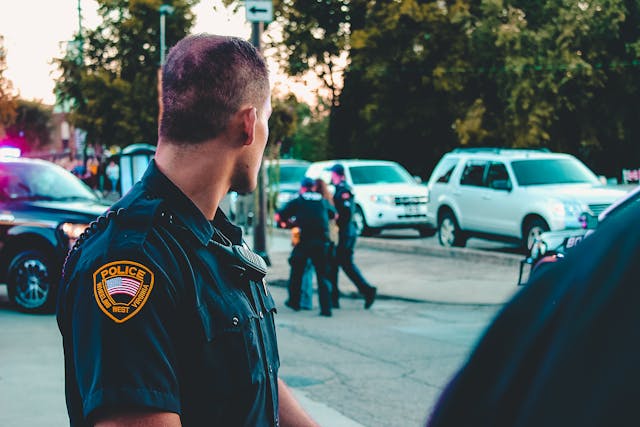Imagine sitting peacefully in your car near your home, only to find yourself suddenly being dragged out, pepper-sprayed, and handcuffed by plain-clothed individuals who claimed to be police officers. This was the terrifying experience of a man in Hounslow, leading to a significant police misconduct case that has drawn public attention.
Taken by Surprise
In an incident of police misconduct in the UK, two officers of the Metropolitan Police have been held liable for misconduct. During a flawed stop-and-search operation, a perfectly innocent man was injured, leading to his hospital admission.
Officer Martin Binala was expelled from the force after he was found guilty of severe misconduct for dishonestly claiming to have smelled cannabis from the car of the man, Karo Grigoryan. His partner, Officer Stuart Dunne, also found guilty of misconduct, received a written warning. The incident occurred as Grigoryan sat in his parked car close to his residence, with the officers failing to adhere to the correct stop and search protocol.
The probe into the police misconduct revealed that the officers mishandled the situation from the onset. They didn’t properly identify themselves as police officers to Grigoryan, who only speaks Polish and Armenian with little English fluency, causing him to fear being robbed. Moreover, they delayed calling an ambulance for Grigoryan and handcuffed him for an excessive period despite finding no drugs in his car. The event has left Grigoryan with physical injuries and traumatic experiences, leading to his fear of any police interactions.
Understanding Stop and Search Procedures
The stop and search procedure is a controversial aspect of law enforcement, often criticised for its potential to be misused. In theory, it’s designed to prevent crime by allowing officers to search individuals they suspect of illegal activity. However, improper execution can lead to negative outcomes, as seen in Grigoryan’s case. Understanding your rights during a stop and search is vital for safeguarding against unwarranted actions.
Police officers must follow specific guidelines, including identifying themselves and explaining the reason for the search. If these protocols are not followed, it may constitute grounds for police misconduct claims. This understanding empowers individuals to take action against the police if necessary, reinforcing the need for transparency and accountability in law enforcement practices.
The Emotional Toll on Victims
Experiencing police misconduct can have lasting emotional and psychological effects. For Karo Grigoryan, the trauma from the incident left him apprehensive of all future police interactions. This type of anxiety is not uncommon among victims of police brutality, who often feel violated by those who are supposed to protect them. The emotional impact underscores the importance of addressing these cases with sensitivity and ensuring victims receive the support and compensation they deserve.
Organisations supporting victims of police misconduct are crucial in providing resources and assistance. They help individuals understand their rights and offer guidance on how to sue the police for compensation. This support network is vital for helping victims rebuild their lives and regain trust in law enforcement.
Stopping Police from Overstepping the Line
For those who have experienced similar incidents of misconduct, understanding the avenues for redress can be beneficial. Police complaints provide a means for victims to formally report their grievances and seek justice. These claims are often the first step in holding officers accountable for their actions. However, the process can be complex, and victims may need legal assistance to navigate it effectively.
Suing the police for compensation is another option available to victims of police misconduct. This legal action can provide financial reparation for the harm suffered, as well as serve as a deterrent against future misconduct. It’s important to consult legal professionals who specialise in actions against the police to assess the viability of such claims and to ensure a robust case is presented. Find one at Policecomplaint.co.uk.
Victims of police misconduct should take immediate steps to protect their rights and seek justice. Documenting the incident thoroughly is essential. This documentation should include detailed descriptions of the event, any evidence such as photographs or videos, and witness statements. Such records can be advantageous when taking action against the police.
Moving Forward with Reforms
To prevent such incidents, reforms in police practices are necessary. This includes improved training on de-escalation techniques and cultural sensitivity, especially in communities with diverse populations. Additionally, policies should be enforced to ensure all officers use body-worn cameras during interactions with the public.
Effective oversight is crucial in maintaining police accountability. Independent bodies like the IOPC play a vital role in investigating misconduct claims and ensuring justice. Strengthening these mechanisms and ensuring transparency in their operations can enhance public confidence in the system.
Educating the public about their rights during police interactions is another critical step. Awareness campaigns and legal resources can empower individuals to stand up for their rights and report any misconduct. Knowledge is a powerful tool in preventing abuses of power and ensuring justice for all.







